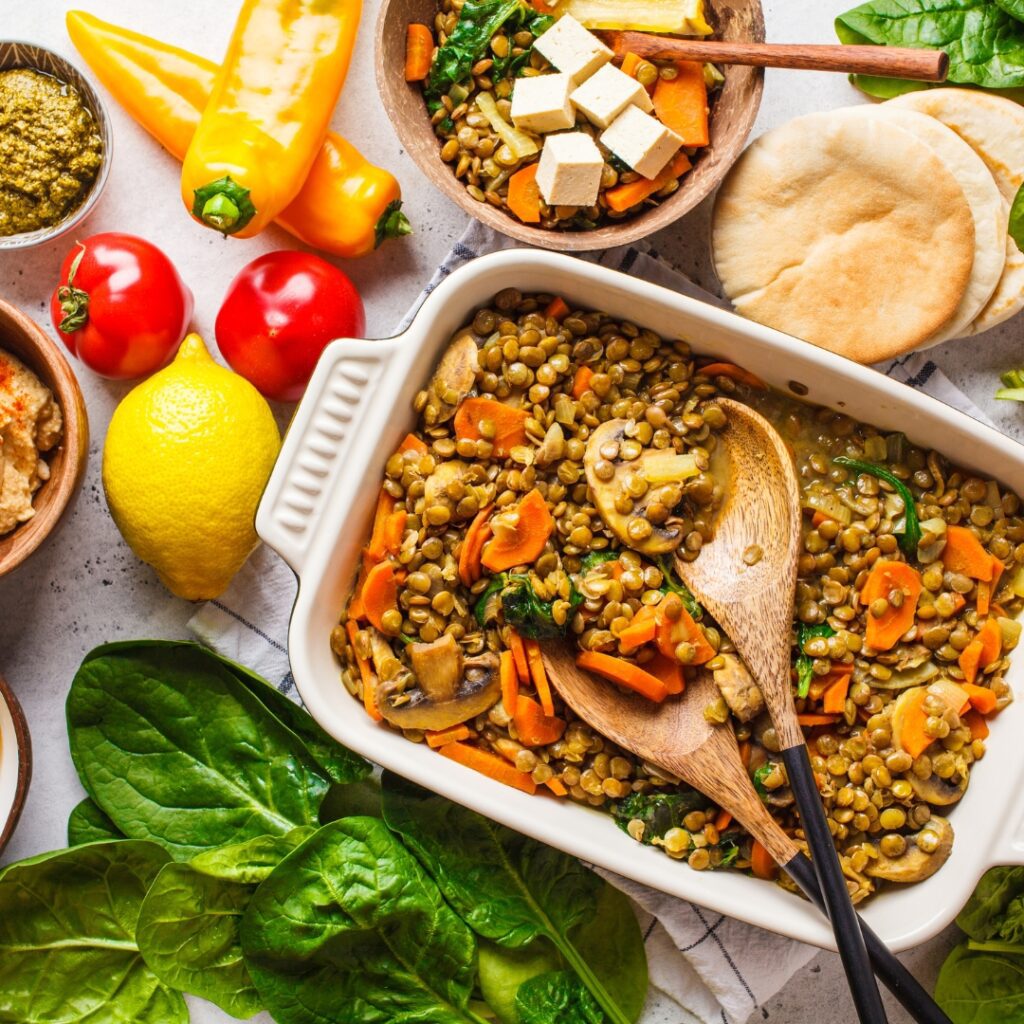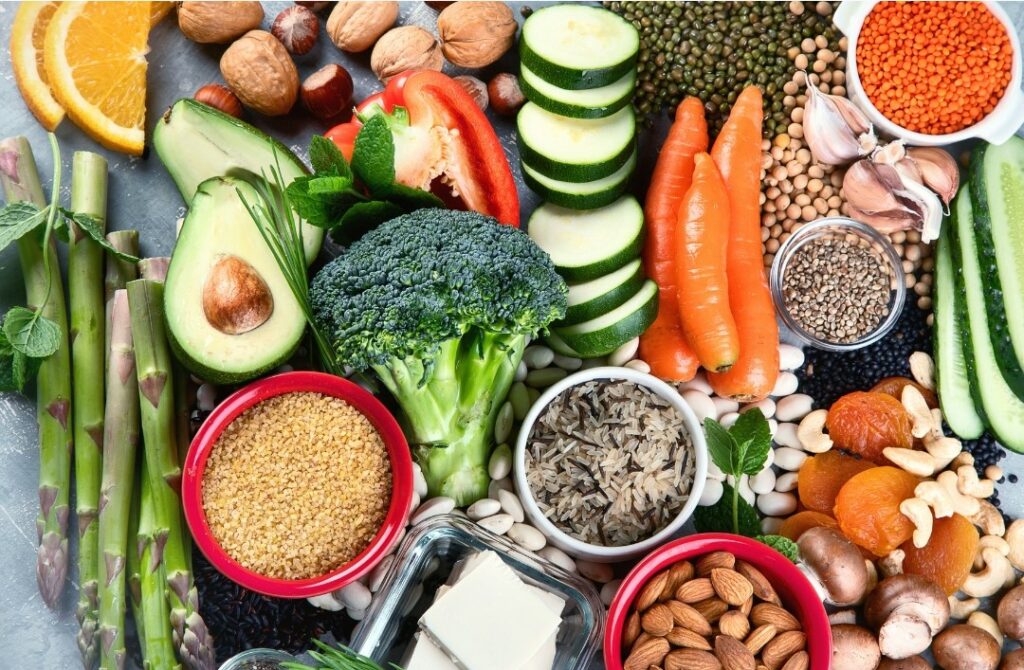Among the paleo, keto and intermittent fasting diets that have become popular in recent years, another very different type of diet has been gaining momentum, one that has little to do with weight loss. ‘Plant-based’ diets, or ‘lifestyles’, are gaining a huge following thanks to their reported health benefits, along with growing concern about animal welfare and the environmental impacts of consuming animal products.
A plant-based diet is made up of predominantly whole, minimally processed plant foods such as fruit and vegetables, whole grains, legumes, nuts and seeds. While strict plant-based diets involve the exclusion of all meat and/or animal products (i.e. vegan or vegetarian), another option has recently become popular for those wanting to have the best of both worlds. The ‘flexitarian’ diet, a combination of the words ‘flexible’ and ‘vegetarian’, allows followers to reap the benefits of a plant-based diet without having to completely shun meat and animal products. While there are no hard and fast rules, flexitarians generally eat meat and animal products on some but not all days of the week depending on their personal preferences.

What are the health benefits of a plant-based diet?
Plant-based eating has been associated with reduced body weight and lower risk of chronic diseases such as heart disease, type 2 diabetes and certain cancers when compared to an omnivorous diet (a diet which includes both plant foods and animal products).
That’s not to say that animal products are unhealthy. Meat, poultry, fish and seafood, eggs and dairy offer a range of nutrients such as protein, iron, B12, omega-3 fatty acids and calcium. However, one of the reasons plant-based diets can result in better heath is because they positively influence our gut microbiota, the bacteria living in our gut. Plant-based eating tends to be higher in fibre and also encourages a greater diversity of plant foods compared to an omnivorous diet. Both of these factors have been found to have beneficial effects on our gut bacteria, which in turn reduces inflammation and hence our risk of developing chronic diseases.
Do plant-based diets align with healthy eating advice?
Despite their current popularity, plant-based diets are actually nothing new. The flexitarian diet is very similar to the Mediterranean diet, which has been around for centuries and has long been considered one of the healthiest diets in the world. They also reflect the recommendations given in our dietary guidelines, which encourage a diet rich in whole grains, fruit, vegetables, nuts and seeds, legumes with some healthy fats and moderate amounts of meat, chicken, fish, eggs and dairy (or alternatives), and minimal amounts of highly processed and refined foods.

Can you get all the nutrients you need on a plant-based diet?
Animal products are a major source of certain nutrients in our diet, particularly iron, B12, calcium and omega-3 fats. It is entirely possible to obtain sufficient amounts of these nutrients on a plant-based diet; however, it’s something you will need to be mindful of when reducing your meat, dairy and egg consumption to ensure you don’t develop nutrient deficiencies.
- Iron
Iron is a mineral involved in the transportation of oxygen in the blood. It’s naturally present in many plant and animal foods, however, the type of iron in animal products (called heme iron) is more easily absorbed than the non-heme iron found in plant foods. Legumes, tofu, nuts and seeds, whole grains and fortified breakfast cereals are all plant-based sources of iron. The absorption of non-haem iron can be increased by combining them with a food high in vitamin C, such as lemon juice, kiwi fruit, red capsicum, broccoli and tomatoes. (Note: spinach contains a considerable amount of iron, however, it’s not readily absorbed by the body due to the presence of oxalates, which bind with the iron, preventing absorption).
- B12
Vitamin B12 is needed by the body to make red blood cells; therefore a deficiency can lead to anaemia. The main source of B12 in the diet is animal products such as meat and eggs. It cannot be produced by plants, so consuming foods fortified with B12 or taking supplements is generally recommended if following a strict plant-based diet.
- Calcium
Healthy bones and teeth rely on adequate amounts of calcium in the diet. Dairy foods are the richest source of calcium, however, it’s also present in some plant foods in smaller amounts. Fortified non-dairy milks, sesame and chia seeds, kale and tofu (if a calcium firming agent is used – check the ingredients on the label) are all plant-based sources of calcium. If avoiding dairy, aim to include plenty of plant-based calcium sources in your diet to protect your bones and teeth. - Omega-3 fatty acids
Omega-3 fatty acids are essential fats, meaning the body can’t make them on it’s own and therefore needs to obtain them from the food we eat. Fish and seafood are one of the richest source of omega-3s, however, they are present in a different form in plant foods such as walnuts, flaxseeds (also called linseeds) and flaxseed oil, chia seeds and leafy green vegetables, so it is possible to consume adequate amounts without eating animal products.
While plant-based diets may not be for everyone, there’s little doubt that most of us could benefit from the inclusion of more plant foods in our diet. However, it’s not necessary to completely exclude animal products to reap the health benefits. From a health perspective, focussing on eating an abundance of whole plant-based foods and reducing highly processed and refined foods is the important part, not whether you include animal products or not. That may mean swapping your usual refined breakfast cereal for oats, replacing the meat in a meal with legumes or tofu a couple of times each week (or adding these into a meat-based dish), adding salad to your meal or choosing fruit and nuts as a snack rather than highly processed snack foods.

Remember, you don’t need to make drastic changes to your diet to improve your health; in most cases small, sustainable changes are far more effective in the long run.
Credit: Skye Swaney, APD
For cooking inspiration, check out our Plant-Based Recipe e-book. Available to download here now.
Nutrition NSW is proudly supported by NSW Health.





